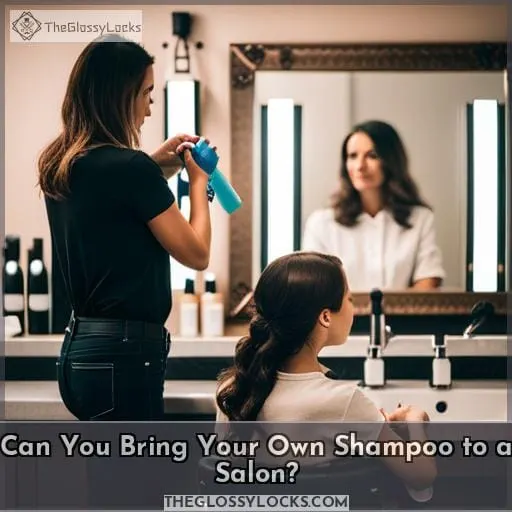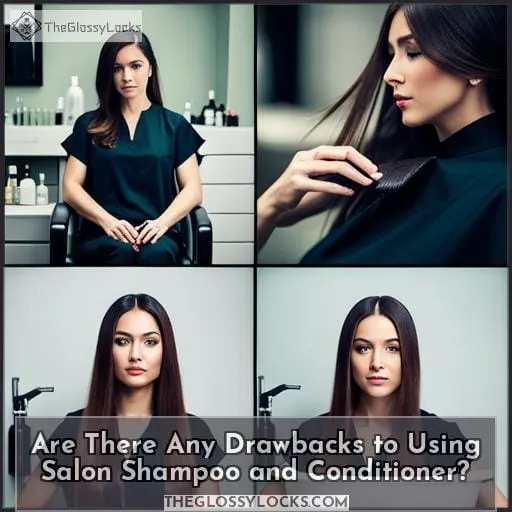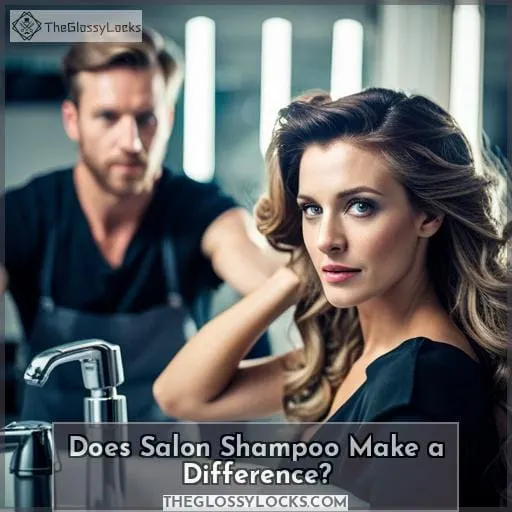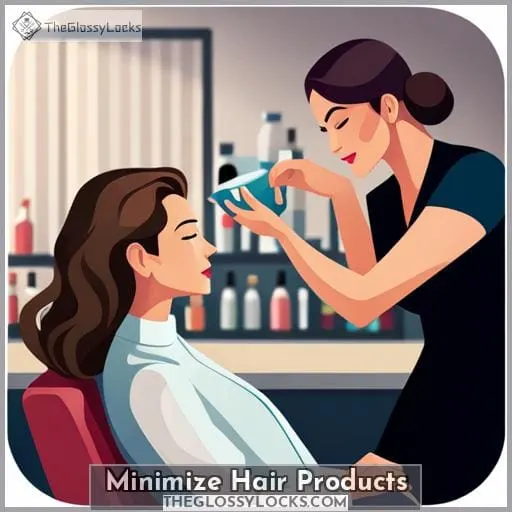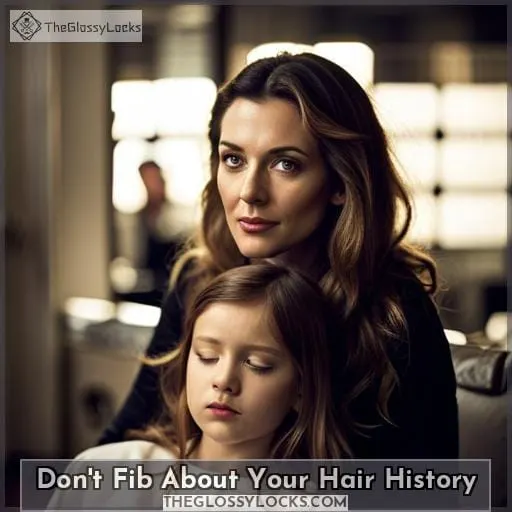This site is supported by our readers. We may earn a commission, at no cost to you, if you purchase through links.
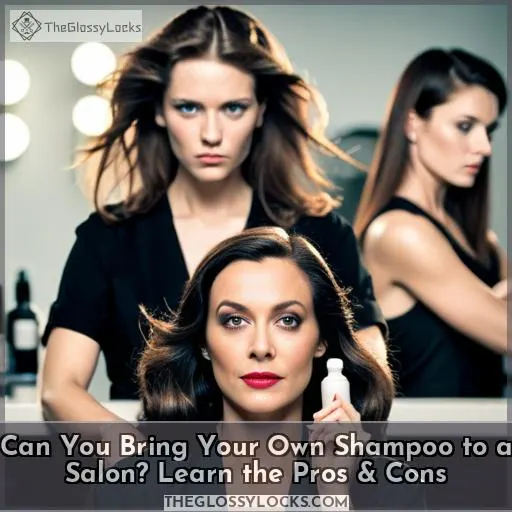
In this article, we’ll explore everything from why some people opt for their own shampoos and conditioners to how they can make sure the experience is still enjoyable. We’ll also discuss what kind of drawbacks could arise when using salon-provided products so that you know exactly what risks are involved before making any decisions.
Get ready as we delve into all the possible scenarios and answer once and for all: can you bring your own shampoo to a salon?
Table Of Contents
- Key Takeaways
- Can You Bring Your Own Shampoo to a Salon?
- Are There Any Drawbacks to Using Salon Shampoo and Conditioner?
- Does Salon Shampoo Make a Difference?
- Minimize Hair Products
- Bring Pictures
- Keep Your Hair Type in Mind
- Don’t Fib About Your Hair History
- Frequently Asked Questions (FAQs)
- How often should I be using salon shampoo?
- What is the best way to communicate my shampoo preferences to my stylist?
- Are there any hairstyles I should avoid if I have psoriasis?
- How can I make sure my salon is equipped to cater to psoriasis clients?
- What are the benefits of using salon shampoo over drugstore shampoo?
- Conclusion
Key Takeaways
- Bring your own shampoo for preference, specific hair types, and sensitivities/allergies.
- Avoid damage from salon shampoos by avoiding harsh chemicals and overuse.
- Ask salon staff for recommendations based on hair type and preferences.
- Salon shampoos have benefits such as superior quality and higher concentrations of natural oils and active agents.
Can You Bring Your Own Shampoo to a Salon?
You may find yourself in a situation where you are wondering if it is okay to bring your own shampoo to the salon. There can be several reasons for doing so, such as personal preference and hair type that needs specific products or treatments.
Additionally, asking for recommendations from the staff at the salon can help ensure that you have great success with your hairstyle.
Reasons for Bringing Own Shampoo
You may want to bring your own shampoo to the salon for a variety of reasons. Whether it’s because you have a sensitive scalp, want specific products or treatments, or just like thicker shampoos. For example, one customer brought her own shampoo on vacation abroad and felt that it helped revitalize her hair.
Salon shampoos can contain harsh chemicals that damage our hair over time. Bringing your own product with natural ingredients can be beneficial in maintaining healthy locks. Hair care products specifically formulated for psoriasis symptoms are often too strong for regular use.
It is recommended to use them only when needed and to avoid dyes, which irritate sensitive scalps.
Using a quality salon shampoo and conditioner will give better results than drugstore brands. However, it’s always best to ask around before making any decisions on what works best for you.
Preferences and Hair Type
People with sensitive hair styles or types may feel better bringing their own shampoo to the salon, as it can depend on personal preference and trust. Scalp care should be taken into account when selecting a product to avoid irritation.
The chemicals in salon and drugstore shampoos have different effects, so comparing them is important for finding the right one for my hair type. Dyes can also cause adverse reactions, so being aware of these potential effects is necessary before going ahead with coloring services at the salon.
Working alongside a stylist who understands individual needs will help achieve desired results without any complications from using unfamiliar products or tools at the salon.
Asking for Recommendations
Ask your stylist for product recommendations that match your hair type and preferences. Braid styles, home care, and deep conditioners can all help promote healthy hair growth.
For those with sensitive scalps or allergies to salon products, it’s important to bring your own shampoo when visiting a salon. Salon shampoos are usually of superior quality, containing fewer harsh chemicals than drugstore brands.
However, they may still strip away natural gloss and texture faster than at-home options.
With over 6 years of experience using both kinds of shampoos, I recommend exploring the benefits each offers so you know what works best for your hair! Research does show spectacular results from using salon shampoo consistently.
Are There Any Drawbacks to Using Salon Shampoo and Conditioner?
Using salon-grade shampoo and conditioner on a regular basis can have some drawbacks, such as diminishing the gloss and texture of your hair over time. Furthermore, frequent use of this type of product can lead to scalp dryness and parched skin, which may result in dandruff or split ends.
It is important to be aware that these types of products are not always beneficial for your hair’s health.
Diminish the Gloss and Texture
Using salon shampoos and conditioners can diminish the shine and texture of your hair, leaving you with brittle locks. Scalp hydration is key to maintaining healthy strands, so consider shampoo selection carefully when styling.
Consider product usage – too much or the wrong type can break down natural oil levels, leading to split ends. Opt for a specific shampoo for your hair type and use natural oils as treatments instead of relying solely on salon products.
Product selection is important, but remember that overuse leads to damage. Make sure you’re using yours correctly to maintain the healthiest tresses possible!
Scalp Becomes Parched
Frequenting a salon without taking proper precautions can leave your scalp parched, so make sure to prep it ahead of time with the right products and treatments for optimal results.
Avoid using sulfates as they strip away moisture from your scalp and increase dryness. Also, dyeing or styling with heat will cause damage if no protection is applied first.
Choose quality salon shampoo that’s designed for your specific hair type instead of drugstore brands. Drugstore brands may contain harsh chemicals like silicone, Sodium Chloride, or Parabens that are damaging in the long run.
Deep conditioning treatments, along with regular trims, can help reduce split ends caused by dryness.
Taking these precautions will ensure you have healthy, smooth locks every time you visit the salon!
Dandruff
If you have dandruff, a common scalp condition that causes flakes and itching, it’s important to take the right steps before visiting a salon.
Use shampoos with coal tar or salicylic acid for best results and avoid scrubbing your scalp as this may aggravate symptoms.
Call ahead of time to request an experienced stylist who is familiar with dealing with psoriasis clients so they can ensure they are well-equipped for the appointment.
To keep your scalp healthy, skip coloring services as dyes irritate sensitive scalps; use prescribed treatments on the day before the visit; bring your own shampoo if unsure about salon products; note plaque locations and desired hairstyle when talking to the stylist.
Collaborating closely with your stylist will help achieve the best look possible without compromising the health of your hair!
Split Ends
Avoiding harsh brushing, hot dryers, and tight styles can help reduce split ends caused by frequent salon visits. Proper washing techniques are also important for preventing split ends. Use lukewarm water when shampooing to prevent hair from becoming too dry or brittle.
Look into alternatives to traditional shampoos, such as natural oils, which nourish the scalp without causing damage.
Gentle brushing is key in avoiding breakage. Only brush enough times necessary and with a soft-bristled brush that won’t pull on your hair too much! Use heat protection products before using any hot tools like curling irons or flat irons.
A lot of people don’t realize how often they need haircuts, but regular trims keep split ends away! Read more about ways to protect your hair against future splitting so you can enjoy beautiful locks every day!
Another fact: if you’re going back-and-forth between salons, ask each one about their quality control policies regarding cleaning combs and scissors. Dirty tools contribute significantly to damaging cuticles, leading to split end disasters.
Does Salon Shampoo Make a Difference?
While salon shampoos may be pricier than drugstore options, the quality is worth every penny. Salon products contain superior ingredients such as extra virgin olive oil that help moisturize and nourish your hair while protecting it from damage.
Additionally, salon shampoo has higher concentrations of natural oils like jojoba or argan oil, which can promote scalp health and add shine to your locks.
When using a salon shampoo with conditioning benefits, you have more styling options available since they are designed to prevent split ends and reduce frizziness caused by heat-styling tools or chemical treatments.
Furthermore, these products typically don’t contain silicones, which can lead to dryness in the long run if used too often – something that’s especially important for those who color their hair regularly!
Finally, talking about what works best for you with a specialist at an upscale professional hairdressing establishment usually ensures better results overall.
Minimize Hair Products
To keep your hair healthy, it’s important to minimize the products you use. For example, 3% of adults suffer from psoriasis on their scalp, and bringing your own shampoo can help manage flare-ups.
Hair damage protection is best achieved by understanding what ingredients are in the product selection and choosing ones with natural treatments like extra virgin olive oil or coconut oil, rather than chemical ingredients such as sulfate-free shampoos purchased at a drugstore.
Salon shampoo also provides superior quality chemicals that lack harmful ingredients like silicone, parabens, or sodium chloride. These ingredients can dehydrate scalps when used frequently, leading to cracking or split ends if washed too often.
Moreover, salon conditioners contain higher concentrations of active agents, providing better results over time with consistency.
With proper research and advice from experienced stylists who know how to handle sensitive scalps associated with psoriasis conditions, along with requesting specific products during pre-appointment consultations, customers will remain happy knowing they made an educated decision about their hair care routine!
Bring Pictures
Bringing pictures of your desired hairstyle to the salon can help ensure you get the look that’s right for you. It also gives stylists an idea of what kind of products and techniques they should use on your hair type, such as deep conditioning treatments to reduce frizziness.
Natural ingredients like oil or natural conditioners can be used for scalp exfoliation and razor bumps. Additionally, a quality salon shampoo that will give a boost to your natural texture without harsh chemicals or stripping away too much moisture from the scalp is recommended.
This way, both parties are clear about what is expected during each appointment so there won’t be any surprises when it comes time to style! Questions about specific products are welcome at most salons.
If you have something special in mind, then don’t hesitate to ask before getting started with a new hairdo.
In addition, bringing some product samples along could save time by helping make sure everyone is on board with exactly how long it will take and which materials need readying beforehand – making sure everything goes according smoothly!
Keep Your Hair Type in Mind
When visiting a salon, consider what type of hair you have and if the products your stylist will be using are suitable for it. Salon shampoos are usually of superior quality but can strip natural gloss and texture faster than drugstore products.
For those with sensitive scalps or who prefer certain brands, bringing your own shampoo is an option to consider. High-quality oils like extra virgin olive oil in salon shampoos help keep scalp health in check, while vegetable oils used by drugstores don’t provide as many benefits over time.
If unsure about product choice at the salon, call ahead to ask for recommendations or bring along your own shampoo with you on vacation abroad to revitalize hair before styling sessions take place. Knowing which types of ingredients work best for each individual’s hair type ensures better results overall when dealing with hairstylists.
Don’t Fib About Your Hair History
Don’t pretend you don’t know the truth, otherwise your stylist may be in for a not-so-pleasant surprise. If you’re dealing with scalp issues, mental health concerns, or oiliness, it’s important to be honest about your hair care history and any products used prior to visiting the salon.
This will help your stylist determine which chemicals are safe for use on your hair and scalp when discussing treatments that could benefit from sulfate-free shampoos or other specialized products.
Plus, they’ll have peace of mind knowing that their advice won’t do more harm than good!
When bringing in shampoo from home, it is essential that customers question why they prefer their own product so as not to insult those provided by the salon. Explain what type of psychology goes into using specific brands, as well as how much better results can look over time with consistency – this will make them more likely to cooperate if given enough information regarding preferences without making them feel uncomfortable due to its necessity being questioned further than just a simple answer like I’d rather use my own.
A polite reminder about prescription shampoos should also be noted along with any other special treatments needed before styling takes place.
Frequently Asked Questions (FAQs)
How often should I be using salon shampoo?
How often should you use salon shampoo? Use it regularly to achieve maximum benefit and enjoy the superior quality ingredients for better results.
What is the best way to communicate my shampoo preferences to my stylist?
Politely inform your stylist of specific shampoo preferences to ensure the best look.
Are there any hairstyles I should avoid if I have psoriasis?
Avoid tight styles, hot dryers, and harsh brushing that can aggravate psoriasis symptoms; collaborate with your stylist for the best look.
How can I make sure my salon is equipped to cater to psoriasis clients?
Ask your dermatologist for recommendations, call salons in advance and inquire about experienced stylists who understand psoriasis care. Make sure the salon is equipped to cater to your needs before scheduling an appointment.
What are the benefits of using salon shampoo over drugstore shampoo?
Salon shampoo is of superior quality, containing active ingredients and higher concentrations. It is more expensive, but you will need less to achieve great results! Avoid drugstore shampoos with harsh chemicals that may damage your hair in the long run.
Conclusion
So, can you bring your own shampoo to a salon? Absolutely! Whether you have a sensitive scalp, you’re looking for specific products and treatments, or you just prefer a thicker shampoo, bringing your own shampoo is a reasonable request.
However, it’s important to remember that salon shampoo has superior quality ingredients that can provide spectacular results over time. Minimize the amount of products you bring and always keep in mind the type of hair you have.
When in doubt, politely explain your preference to the stylist, and don’t forget to ask for their recommendations. With the right care and attention, you can have a great hairstyle without sacrificing the health of your hair.

